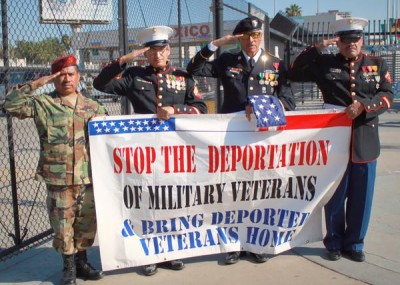The Deportation of Veterans, the Creation of A New Class Of “Disposable U.S. Soldiers”

At the San Ysidro-Tijuana Border Port of Entry, San Diego (April Arreola / Creative Commons)
The ongoing attack on Bowe Bergdahl, the captive U.S. Army sergeant exchanged on May 31 for five Afghan prisoners held at the Guantanamo Bay Naval Base, demonstrates the lengths many in the United States are willing to go to persecute those perceived to have undermined U.S. war efforts. Having disappeared from his army base in 2009, Bergdhal has since been ridiculed for his alleged frustration with the U.S. war in Afghanistan. However great the importance of this case, the Bergdahl controversy should not obscure one of the most egregious of the systematic and official forms of what is effectively the disposal of U.S. soldiers: the deportation of veterans who are not U.S. citizens.
 Like deportations in general, the number of military veterans sent into exile has ballooned since the mid-1990s. Changes in U.S. law in 1996 greatly expanded the number of deportable offenses, while eliminating the ability of judges to exercise any discretion in the vast majority of cases. Combined with a congressionally imposed quota that requires that ICE maintain 34,000 detention beds for immigrants daily, this has led to many more veterans falling within the deportation regime’s cross hairs. In his recently published and important book, Reform Without Justice: Latino Migrant Politics and the Homeland Security State, political scientist Alfonso Gonzales opens with the story of one such veteran. His name is Bernardo, someone Gonzales met in Mexico City in November 2010 at a protest against U.S. immigration policy.
Like deportations in general, the number of military veterans sent into exile has ballooned since the mid-1990s. Changes in U.S. law in 1996 greatly expanded the number of deportable offenses, while eliminating the ability of judges to exercise any discretion in the vast majority of cases. Combined with a congressionally imposed quota that requires that ICE maintain 34,000 detention beds for immigrants daily, this has led to many more veterans falling within the deportation regime’s cross hairs. In his recently published and important book, Reform Without Justice: Latino Migrant Politics and the Homeland Security State, political scientist Alfonso Gonzales opens with the story of one such veteran. His name is Bernardo, someone Gonzales met in Mexico City in November 2010 at a protest against U.S. immigration policy.
At the age of one, Bernardo and his family migrated from the resort city of Cancun to the United States. From that time, he lived what he characterized as “an American life.” He eventually joined the U.S. military and was deployed to the Persian Gulf during the 1991 war.
In 1993, soon after leaving the military, Bernardo made the mistake of drinking three beers before driving, and was arrested in California for driving under the influence (DUI). Seventeen years later, U.S. Immigration and Customs Enforcement (ICE) detained him while raiding the mattress factory where he worked and found out about his DUI conviction. Under California law, such a transgression is a misdemeanor, but under federal law, for a noncitizen, it is an aggravated felony, thus making Bernardo subject to deportation. After six months in detention, the Department of Homeland Security (DHS) “removed” Bernardo despite his having U.S. citizen children to support.
Or take the case of Howard Dean Bailey, who migrated to the United States as a teenager in 1989 and joined the U.S. Navy soon after graduating from Boys and Girls High School in Brooklyn. While still in the military, he agreed to help out a friend who worked on the same naval base in Norfolk, Virginia by bringing him a package that had arrived in the mail. Unbeknownst to Howard, the package contained marijuana and the police were tracking it. Arrested while driving the package to his friend’s home, Howard was convicted of felony possession of marijuana with intent to distribute, and received a 15 months in a state work camp.
Upon his release, he rejoined his wife, who had given birth to their daughter in his absence, and eventually started a successful small business. Many years later, in 2010, ICE agents, with guns drawn, arrested him at his home. Howard spent the next two years in detention, and was deported to Jamaica in May 2012, a country he had not visited since leaving more than 20 years earlier. His wife and two teenage children were left behind in Virginia.
These are just two of countless cases involving the deportation of U.S. veterans who joined the military as “permanent” legal residents. In 2012, reports the Pentagon, 24,000 noncitizens were enlisted in the U.S. military, with approximately 5,000 green card holders joining each year. According to Banished Veterans, a support and advocacy group, DHS has deported thousands of vets—including wounded and decorated ones—in recent years. The precise number is not known as DHS does not count veterans as a separate category of deportees.
Corresponding to the deportee population as a whole, large numbers of deported vets want to come back to the United States—the country they see as their home. Ironically, only in death are deported veterans allowed to return. Like all veterans (except those dishonorably discharged), they are, also entitled to burial at a U.S. military cemetery, their casket covered with a U.S. flag and with an engraved headstone. The Pentagon will even foot part of the bill—up to $300—to repatriate the remains of the deported veteran.
Through both official and popular rhetoric, veterans are venerated. But in practice, as illustrated by the large number of homeless vets, extraordinary rates of unemployment, and the recent Veterans Affairs scandal that brought to light the deaths of vets caused by extended waits for medical care, the government provides woefully insufficient support for many veterans. While singing their praises for purposes of public consumption, Washington disposes of all too many soldiers by skirting its responsibility towards veterans—a practice that is heightened in its severity for noncitizen veterans. Dividing even those who serve the Pentagon and swear allegiance to the U.S. constitution, the U.S. borders have become militarized in more ways than one.
Joseph Nevins teaches geography at Vassar College in Poughkeepsie, New York. Among his books areDying to Live: A Story of U.S. Immigration in an Age of Global Apartheid (City Lights/Open Media, 2008) and Operation Gatekeeper and Beyond: The War on “Illegals” and the Remaking of the U.S.-Mexico Boundary (Routledge, 2010). For more from the Border Wars blog, visit nacla.org/blog/border-wars. Now you can follow it on Twitter @NACLABorderWars.

